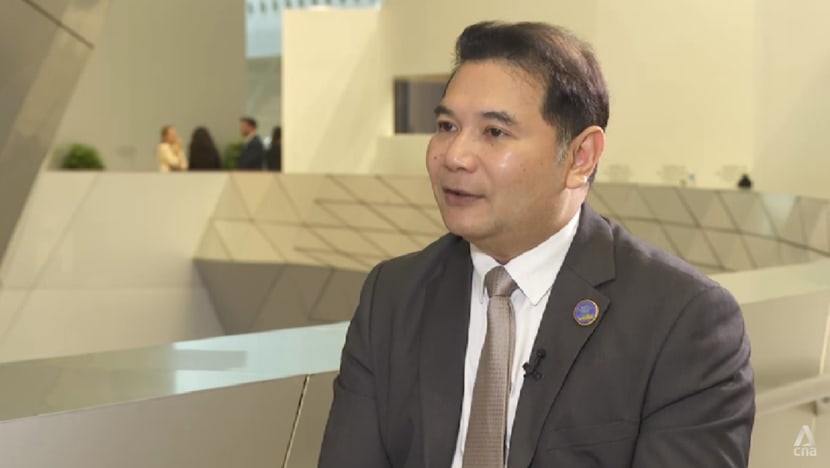Energy transition will propel Malaysia’s economy, needs to ‘survive multiple administrations’: Economy minister
In an interview with CNA's Olivia Siong at a World Economic Forum conference in Dalian, China, Malaysia's Economy Minister Rafizi Ramli said the government’s belief in energy transition is not rhetoric.

Malaysia’s Economy Minister Rafizi Ramli said energy transition is a catalyst for higher quality investments to propel the country forward.

This audio is generated by an AI tool.
DALIAN, China: Malaysia’s Economy Minister Rafizi Ramli said energy transition is a catalyst for higher quality investments to propel the country forward.
This comes as Malaysia works towards a target of 70 per cent of renewables in its power mix by 2050.
He said the benefits of energy transition transcends party politics in Malaysia and needs to stay on course regardless which government is at the helm.
“Energy transition is good for the economy and has to survive multiple administrations into the next 30 years”, Mr Rafizi told CNA on the sidelines of a World Economic Forum conference in Dalian, China on Wednesday (Jun 26).
The belief in energy transition is not rhetoric, he stressed.
“I think the philosophy is quite laid out, but the nimbleness to roll out each specific component of the implementation is something that we have to be very careful about,” he said.
“One obvious risk is that there will be disagreements here and there, and if (we’re) not careful, then we cannot see (it) through.”
POLITICAL WILL CRUCIAL TO MEET GREEN TARGETS
To achieve this, the government has to map out various considerations, such as what to invest in and how to improve regulations to make the transition more sustainable.
“The last thing you want to do is to introduce shock to the economy and society,” said Mr Rafizi.
“So the biggest consideration – and I think the biggest challenge of any government trying to do it – is to really balance all these competing considerations. It's quite obvious any economy trying to do this will have to deal with the impact on cost.”
He believes that political will is crucial for the country to meet its green targets.
On the government's considerations about the timing of its moves, Mr Rafizi said: “It's up for debate when it is a good timing.
“Personally, I think common sense will prevail as the public sees that this is not something that we conjure up. It is for the future sustainability of the economy. It makes us more prepared to manage the political risk that comes with it.”
TRICKIEST PART IS MANAGING SOCIETAL IMPACT
Businesses and even the public are realising that high quality investments “come with requirements for green energy”, Mr Rafizi pointed out.
“That realisation sort of provides a counterbalance to the negative political narrative against any policy that has a knock-on effect on the public.”
He told CNA that the trickiest part is managing the impact on society.
“I won't say that we have done it well,” he said. “It is a long way to go, but we sequence it in such a way that we prioritise important elements.”
This comes as Malaysia has reached a critical inflection point in its energy needs, beyond which it risks becoming “a net importer” of oil and gas, he noted, referring to a term for a country that imports more than it exports.
“Timing wise, we are trying our best to create awareness in our economy and the public that our energy mix is not sustainable if we don't pivot,” he added.
“And therefore, the sooner (we) pivot, the better.”
CONTINUING WITH SUBSIDY RATIONALISATION
In the interview with CNA, Mr Rafizi also defended the government's move to cut domestic fuel subsidies as a key part of fiscal consolidation.
Malaysia on Jun 10 cut most of its diesel subsidies, which the authorities said was costing the country RM4 billion (US$849 million) annually.
The diesel subsidy reforms were the third government initiative implemented to restructure the country's subsidy distribution system, after subsidy rationalisation for electricity tariffs and chicken sales announced last year.
The moves come as part of a larger shift away from costly blanket subsidies.
“If you notice how we have managed the sequencing of sensitive and major policies, like the retargeting of fuel subsidies, the focus has always been to prepare the necessary system in place,” said Mr Rafizi.
“Then, the government will decide on rolling it out once it achieves certain parameters that we have set internally.”
Market watchers are now closely monitoring for the next move in the subsidy rationalisation programme.
“But I hope at the same time, the market understands by now that we intend to do it, and we have done it,” said Mr Rafizi on the government’s intention to continue with the initiative.
“The subsidy rationalisation programme is a core element of our fiscal consolidation programme. It's just that given the nitty gritty of it and the sensitivity, it is best that the step-by-step is kept close to the government’s chest.”

















